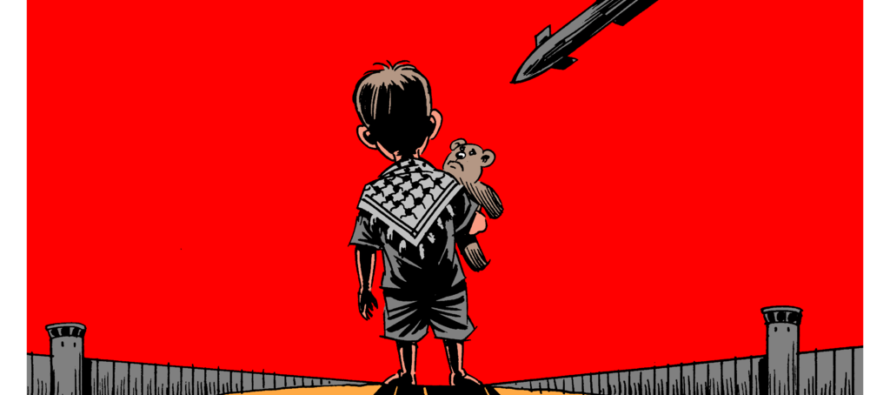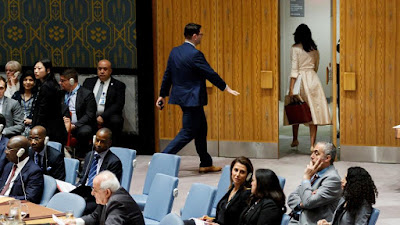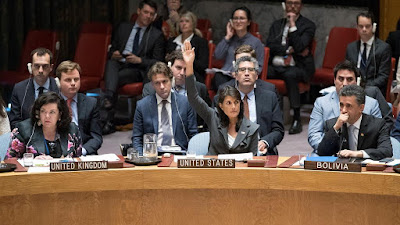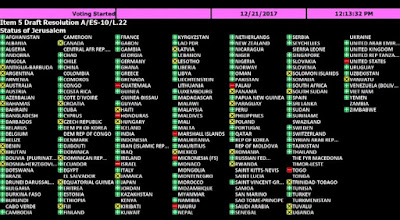13 de junio del 2018: Asamblea General de Naciones Unidas convocada para discutir la dramática situación en Gaza

![]()
Este próximo 13 de junio está convocada una reunión urgente de la Asamblea General de Naciones Unidas, convocada a solicitud de Argelia y Turquía para examinar la situación en Gaza y la violencia que ya enluta a más de un centenar de familas palestinas (véase nota de RTVE, España) desde el pasado 14 de mayo. A los miles de heridos provocados por la respuesta desproporcional de las fuerzas militares a las manifestaciones en Gaza, hay que añadir un mortífero saldo de 124 muertes, al 9 de junio del 2018 (véase nota de France24).
Como se recordará, el pasado 1ero de junio, el Consejo de Seguridad de Naciones Unidas votó un proyecto de resolución presentado por Kuwait con relación a la urgente necesidad de proteger a los civiles palestinos y sus vidas. Este proyecto de resolución se discutió ante el recrudecimiento de la violencia, el cual se originó a partir del pasado 14 de mayo, y el uso desproporcional e indiscriminado de la fuerza por parte de las fuerzas israelíes contra civiles palestinos, incluyendo a mujeres y a menores de edad. El proyecto de resolución kuwaití fue vetado por Estados Unidos.
Breve puesta en contexto
Cabe precisar que Israel y Estados Unidos escogieron el 14 de mayo, día de la proclama de independencia de Israel y víspera de la conmemoración de la Nakba para Palestina, para inaugurar oficialmente la sede diplomática norteamericana en Jerusalén, un hecho condenado por varios integrantes de la comunidad internacional, incluyendo a la Organizacón de la Conferencia Islámica que preside Turquía (véase declaración oficial del 15/5/2018). Se trata de una acción norteamericana que la comunidad internacional no debiera de pasar por alto, y remitimos a nuestros estimables lectores a nuestras reflexiones publicadas en MiddleEastMonitor, bajo el título “The US Embassy move to Jerusalem: the need for a response from the international community“. Entre algunas opciones, se sugiere que Estados que aún no han reconocido a Palestina como Estado lo hagan: en el caso de España, se trata de una asignatura pendiente desde noviembre del 2014, mes en el que el pleno del Congreso de España adoptó una resolución mediante la cual “instaba” al Poder Ejecutivo a reconocer a Palestina como Estado, con 319 votos a favor, una abstención y dos votos en contra.
Nótese que el repudio a las exacciones israelíes es cada vez mayor debido a las muertes de civiles acaecidas en los últimos días. Una de ellas siendo la de una jóven enfermera palestina de 21 años, Razan Al-Najar: fue abatida a tiros el mismo viernes 1ero de junio mientras prestaba primeros auxilios a palestinos heridos, como voluntaria médica cerca de la frontera con Gaza (véase nota de prensa de Debate en México titulada “Tenía 21 años, atendía emergencias y acabaron con su vida”“). La reciente suspensión, el pasado 5 de junio, de un partido de fútbol entre las selecciones de Israel y de Argentina previsto en Jerusalén para este 9 de junio, y la anterior cancelación de un concierto de la popular cantante colombiana Shakira en Israel (29 de mayo), evidencian este profundo repudio a Israel que, desde la sociedad civil, se manifiesta.
Foto de la delegada de Estados Unidos saliendo de la sala de sesiones del Consejo de Seguridad al iniciar su alocución el representante de Palestina el pasado 15 de mayo del 2018, extraida de nota de prensa titulada “EE.UU. se queda solo en la ONU” (La Vanguardia, edición del 16/5/2018)
La resolución propuesta por Kuwait en el Consejo de Seguridad en breve
Materializado el traslado de la embajada norteamericana a Jerusalén el 14 de mayo, las manifestaciones en Palestina no tardaron, así como la violenta respuesta israelí, con un saldo de 59 muertes palestinas acaecidas el mismo 15 de mayo. Una versión inicial del texto kuwaití circuló el 17 de mayo entre las delegaciones de los Estados Miembros del Consejo de Seguridad, y dos rondas de negociaciones tuvieron lugar el 21 y el 25 de mayo en aras de revisar el texto. Un tercer borrador fue sometido nuevamente a consultas el 29 de mayo.
El 31 de mayo, Estados Unidos emitió un comunicado indicando que vetaría el texto en caso de ser sometido a conocimiento del Consejo de Seguridad, dando a conocer sus ya acostumbradas razones (que encuentran eco en una gran cantidad de medios de prensa y en analistas): véase texto del comunicado oficial del Departamento de Estado norteamericano titulado “Statement on a Draft UN Security Council Resolution on the Situation in Gaza” que concluye con una frase que intenta invertir la pérdida de credibilidad de la que sufre Estados Unidos desde varios meses: “Those who choose to vote in favor of this resolution will clarify their own lack of fitness to take part in any credible negotiations between the two parties“.
El texto finalmente puesto a conocimiento de los demás integrantes del Consejo de Seguridad y votado (véase texto en inglés reproducido al final de esta nota), incluye 16 párrafos operativos, y señala en la parte operativa que el Consejo de Seguridad:
“1. Calls for full respect by all parties for international human rights law and international humanitarian law, including in regards to the protection of the civilian population, and reiterates the need to take appropriate steps to ensure the safety and well-being of civilians and ensure their protection, as well as to ensure accountability for all violations;
“2. Deplores the use of any excessive, disproportionate and indiscriminate force by the Israeli forces against Palestinian civilians in the Occupied Palestinian Territory, including East Jerusalem, and particularly in the Gaza Strip, including the use of live ammunition against civilian protesters, including children, as well as medical personnel and journalists, and expresses its grave concern at the loss of innocent lives;”
3. Demands that Israel, the occupying Power, refrain from such actions and fully abide by its legal obligations and responsibilities under the Fourth Geneva Convention relative to the Protection of Civilian Persons in Time of War of 12 August 1949 ;
4. Deplores any actions that could provoke violence and endanger civilian lives and calls on all actors to ensure that protests remain peaceful;
5. Deplores the firing of rockets from the Gaza Strip against Israeli civilian areas; ”
Foto tomada de artículo de prensa titulado “US vetoes Kuwait UN proposal to protect Palestinians” (The National, Emiratos Arabes Unidos).
El resultado del voto del 1ero de junio fue el siguiente: 10 votos a favor, 1 voto en contra (Estados Unidos) y 4 abstenciones (Etiopía, Paises Bajos, Polonia y Reino Unido). El voto en contra de Estados Unidos equivale a un veto, por lo que la resolución fue descartada. No obstante, la lectura detallada de su texto y su comparación con la versión inicial permiten apreciar el resultado de las negociaciones entre delegaciones y plantean algunas preguntas con relación a los cuatro Estados que optaron por abstenerse.
Otro texto, otro voto, y … un solo voto a favor
Es de recalcar que otro voto tuvo lugar el pasado 1ero de junio en el seno del Consejo de Seguridad, con relación esta vez a un texto elaborado y presentado por Estados Unidos, omitiendo, entre otros aspectos, referencias a las fuerzas israelíes y a la expresión “Palestinian civilians” y enfatizando la responsabilidad directa del Hamas (véase nota de prensa de Europe 1 y titulada “ONU : le Conseil de sécurité rejette un projet de résolution américain sur Gaza” ). El texto de este proyecto de resolución norteamericano está disponible en este enlace. El resultado del voto fue de un único voto a favor (Estados Unidos), tres en contra (Bolivia, Kuwait y Rusia)y once abstenciones, por lo que este texto tampoco fue aprobado.
Con relación a este segundo voto (poco divulgado en algunos medios de prensa y omitido por algunos analistas), agradecemos sobremanera a nuestros estimables lectores proporcionarnos alguna resolución anterior del Consejo de Seguridad puesta a votación y que solamente haya recibido un voto a su favor. Estamos tal vez presenciando – sin saberlo – una verdadera “première” en toda la historia de Naciones Unidas desde 1945, y sólo con la ayuda de finos conocedores de Naciones Unidas podremos confirmarla como tal.
Por respeto a los civiles palestinos que ya no están, a su memoria, al sufrimiento que embarga a muchas familias palestinas, no reproducimos este segundo texto. El hecho que únicamente su autor haya votado a favor es ya en sí extremadamente revelador, evidenciando, además de la pérdida de credibilidad antes mencionada, que algo muy básico que se enseña en todas las academias diplomáticas se ignoró por completo por parte de la delegación de Estados Unidos: al presentar un texto a ser votado, un diplomático siempre debe ver la manera de presentarlo de forma tal que logre reunir varios votos a favor.
Los lectores interesados en entender las razones por las que este texto no logró reunir más que el voto del Estado que lo redactó, pueden examinar su contenido en el enlace antes mencionado o bien, nos lo pueden solicitar: les será remitida la versión en inglés que fue distribuida a los demás integrantes del Consejo de Seguridad (su solicitud debe ser dirigida al siguiente correo electrónico: cursodicr(a)gmail.com).
Más allá del triste espectáculo dado por la delegación norteamericana este 1ero de junio del 2018, cabe recordar que una situación inversa relacionada al aislamiento de Estados Unidos se vivió el 18 de diciembre del 2017. Al votarse un proyecto de resolución propuesto por Egipto (véase texto completo) condenando el traslado de embajadas a Jerusalén, el resultado de la votación fue el siguiente: 14 votos a favor y uno solo en contra (Estados Unidos). Remitimos a nuestros estimables lectores a un breve nota que elaboramos sobre este voto, disponible aquí y titulada precisamente: “Votación en el Consejo de Seguridad sobre reconocimiento de Jerusalén como capital: 14 votos y un veto“.
A modo de conclusión: un probable voto contudente en la Asamblea General
Vetada por Estados Unidos, como predecible, también lo es que esta misma resolución presentada por Kuwait sea ahora endosada por otros Estados y puesta a consideración esta vez de la Asamblea General de Naciones Unidas: esta cita está programada para el próximo Miércoles 13 de junio en Nueva York. Con relación a la presiones que deben de ejercer desde ya Estados Unidos e Israel sobre distintos Estados para que voten en contra, se abstengan o bien opten por el “No Show” durante la votación, el resultado final permitirá apreciar cuán efectivas son estas presiones.
Después del voto de 14-1 obtenido para la resolución condenando el traslado de embajadas a Jerusalen en el seno del Consejo de Seguridad del 18 de diciembre del 2017, el 21 de diciembre el mismo texto fue puesto a votación en la Asamblea General, registrándose la siguiente votación: 128 votos a favor, 9 votos en contra, 35 abstenciones y 26 “No Show” (véase comunicado oficial de Naciones Unidas). En América Latina, Brasil, Bolivia, Chile, Costa Rica, Cuba, Ecuador, Perú, Uruguay y Venezuela votaron a favor, Argentina, México y Paraguay se abstuvieron mientras que Honduras y Guatemala votaron en contra.
En el caso más específico de Centroamérica, históricamente objeto de mayores presiones en este tipo de votaciones por parte de Israel y de Estados Unidos, el resultado fue el siguiente: Costa Rica y Nicaragua votaron a favor, Guatemala y Honduras en contra, Panamá se abstuvo y El Salvador optó por el “No Show“. Menos de 24 horas después de este voto, Estados Unidos reconoció como legítimos los resultados de las cuestionadas elecciones realizadas en Honduras (véase comunicado oficial del Departamento de Estado).
Cabe señalar que después de la inauguración de la embajada de Estados Unidos en Jerusalén del pasado 14 de mayo, procedieron de igual manera, en presencia de su respectivo Jefe de Estado que se desplazó personalmente a Israel para la ocasión, Guatemala (16 de mayo) así como Paraguay (21 de mayo).
Foto del tablero de votación del 21 de dicembre, extraida de nuestro artículo publicado en MonitordeOriente, edición del 24 de diciembre del 2017, y titulado: “Contundente rechazo de la Asamblea General de Naciones Unidas al reconocimiento de Jerusalén como capital de Israel”
—–
Texto del proyecto de resolución presentado por Kuwait y votado el pasado 1ero de junio del 2018 por el Consejo de Seguridad
” The Security Council,
Recalling all of its relevant resolutions, including, inter alia, resolutions 242 (1967), 338 (1973), 605 (1987), 904 (1994), 1397 (2002), 1544 (2004), 1515 (2003), 1850 (2008), 1860 (2009), and 2334 (2016),
Recalling also its Presidential Statement 2014/13 of 28 July 2014,
Bearing in mind the letter (S/2015/809) of 21 October 2015 by the Secretary-General,
Recalling also its resolutions on the protection of civilians in armed conflict, including its resolutions on children and armed conflict, including, inter alia, resolutions 1894 (2009) and 2225 (2015), as well as its relevant presidential statements, and its resolutions on the protection of medical and humanitarian personnel and on the protection of journalists, media professionals and associated personnel in armed conflicts, including, inter alia, resolutions 2286 (2016) and 2222 (2015), as well as its other relevant resolutions and presidential statements,
Reaffirming the obligation to respect and ensure respect for international humanitarian law in all circumstances in accordance with Article 1 of the Geneva Conventions,
Expressing its grave concern at the escalation of violence and tensions and the deterioration of the situation in the Occupied Palestinian Territory, including East Jerusalem, in particular since 30 March 2018, and its deep alarm at the loss of civilian lives and the high number of casualties among Palestinian civilians, particularly in the Gaza Strip, including casualties among children, caused by the Israeli forces,
Condemning all acts of violence against civilians, including acts of terror, as well as all acts of provocation, incitement and destruction,
Reaffirming the right to peaceful assembly and protest, freedom of expression and of association,
Emphasizing the need to pursue measures of accountability, stressing in this regard the importance of ensuring independent and transparent investigations in accordance with international standards,
Alarmed at the exacerbation of the dire humanitarian crisis in the Gaza Strip, and stressing the need to achieve a sustainable solution to this crisis in line with international law,
Stressing the particular impact that armed conflict has on women and children, including as refugees and displaced persons, as well as on other civilians who may have specific vulnerabilities, including persons with disabilities and older persons, and stressing the need for the Security Council and Member States to strengthen further the protection of civilians,
Recalling that a lasting solution to the Israeli-Palestinian conflict can only be achieved by peaceful means in accordance with international law and the relevant United Nations resolutions and through credible and direct negotiations,
Stressing that the Gaza Strip constitutes an integral part of the Palestinian territory occupied in 1967, Reaffirming the right of all States in the region to live in peace within secure and internationally recognized borders,
1. Calls for full respect by all parties for international human rights law and international humanitarian law, including in regards to the protection of the civilian population, and reiterates the need to take appropriate steps to ensure the safety and well-being of civilians and ensure their protection, as well as to ensure accountability for all violations;
2. Deplores the use of any excessive, disproportionate and indiscriminate force by the Israeli forces against Palestinian civilians in the Occupied Palestinian Territory, including East Jerusalem, and particularly in the Gaza Strip, including the use of live ammunition against civilian protesters, including children, as well as medical personnel and journalists, and expresses its grave concern at the loss of innocent lives;
3. Demands that Israel, the occupying Power, refrain from such actions and fully abide by its legal obligations and responsibilities under the Fourth Geneva Convention relative to the Protection of Civilian Persons in Time of War of 12 August 1949 ;
4. Deplores any actions that could provoke violence and endanger civilian lives and calls on all actors to ensure that protests remain peaceful;
5. Deplores the firing of rockets from the Gaza Strip against Israeli civilian areas;
6. Calls for urgent steps to ensure an immediate, durable and fully respected ceasefire;
7. Calls for the exercise of maximum restraint and calm by all parties and the need for immediate and significant steps to stabilize the situation and to reverse negative trends on the ground;
8. Reaffirms its willingness to respond to situations of armed conflict where civilians are being targeted or humanitarian assistance to civilians is being deliberately obstructed, including through the consideration of appropriate measures that the Security Council may take in accordance with the Charter of the United Nations;
9. Calls for the consideration of measures to guarantee the safety and protection of the Palestinian civilian population in the Occupied Palestinian Territory, including in the Gaza Strip;
10. Calls also for immediate steps towards ending the closure and the restrictions imposed by Israel on movement and access into and out of the Gaza Strip, including through the sustained opening of the crossing points of the Gaza Strip for the flow of humanitarian aid, commercial goods and persons in accordance with international law, including as it pertains to legitimate security requirements;
11. Demands that all parties cooperate with medical and humanitarian personnel to allow and facilitate unimpeded access to the civilian population, and calls for the cessation of all forms of violence and intimidation directed against medical and humanitarian personnel;
12. Urges the provision of immediate and unimpeded humanitarian assistance to the Palestinian civilian population in the Gaza Strip, bearing in mind critical medical, food, water and fuel needs, and urges increased support to the United Nations Relief and Works Agency for Palestine Refugees in the Near East, recognizing the vital role of the Agency, alongside other UN agencies and humanitarian organizations, in providing humanitarian and emergency assistance, notably in the Gaza Strip;
13. Encourages tangible steps towards intra-Palestinian reconciliation, including in support of the mediation efforts of Egypt, and concrete steps to reunite the Gaza Strip and the West Bank under the legitimate Palestinian government and ensure its effective functioning in the Gaza Strip;
14. Welcomes and urges further engagement by the Secretary-General and the United Nations Special Coordinator for the Middle East Peace Process to assist, in cooperation with concerned partners, in the efforts to immediately de-escalate the situation and address urgent infrastructure, humanitarian, and economic development needs, including through the implementation of projects endorsed by the Ad Hoc Liaison Committee;
15. Requests the Secretary-General to examine the present situation and to submit a written report, as soon as possible, but not later than 60 days from the adoption of the present resolution, containing, inter alia, his proposals on ways and means for ensuring the safety, protection and well-being of the Palestinian civilian population under Israeli occupation, including, inter alia, recommendations regarding an international protection mechanism;
16. Calls for renewed and urgent efforts to create the conditions necessary to launch credible negotiations on all final status issues to achieve, without delay, an end to the Israeli occupation that began in 1967 and a comprehensive, just and lasting comprehensive peace based on the vision of a region where two democratic States, Israel and Palestine, live side by side in peace with secure and recognized borders, on the basis of the relevant United Nations resolutions, the Madrid terms of reference, including the principle of land for peace, the Arab Peace Initiative and the Quartet Roadmap, as called for in resolution 2334 (2016) and its other relevant resolutions;
17. Decides to remain seized of the matter.“
Related Articles
Palestinians submit UN statehood bid
![]()
AP, UNITED NATIONS Palestinian President Mahmoud Abbas (L), gives a letter requesting recognition of Palestine as a state to
Somehow the Flowers were Silent
![]()
Shireen Abu Akleh, correspondent for Al Jazeera Arabic, assassinated on May 11, 2022, Jenin Camp, in the Occupied West Bank
US Plans ‘Gazafication’ of the West Bank
![]()
Kerry’s Framework Agreement In recent days, US and European diplomats have been engaged in a frenzy of activity on the






